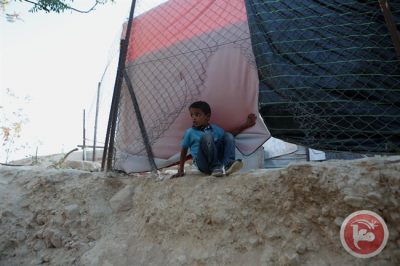Trump Imperils the Peace Process
The UK should reaffirm that Israeli settlements are unlawful, says William Bell

The Trump administration’s declaration that it does not consider Israeli settlements in the occupied Palestinian territory a violation of international law has torn up four decades of American policy, and risks making life even worse for the most marginalised groups in the region.
At Christian Aid, we work with both Israeli and Palestinian organisations to promote universal accountability and the rule of law as the cornerstone of a just and viable peace. This summer, I visited the Palestinian village of Umm al-Kheir, in the south Hebron Hills. Originally from Arad, this community of refugees settled here without incident until 1981, when Israel began construction of the Carmel settlement on half the village land. Now a community of approximately 500 Israeli citizens living on Palestinian land, the contrast between the two communities could not be starker.
The illegal settlement is a modern “town” with all the amenities that you would expect: running water, electricity, paved roads. Indeed, a pylon carries electricity from the settlement to their chicken shed over the top of the Palestinian village, which is without power. Many of the Palestinian homes, a mix of makeshift containers and traditional tents, have demolition orders on them, as Israel alleges that they are built without permits.
LAST week, however, the Trump administration unilaterally declared that it does not consider Israeli settlements, such as Carmel, in the occupied Palestinian territory, a violation of international law. The UK government must now unequivocally reaffirm that it still considers these settlements as both unlawful and an obstacle to a just peace for the sake of Palestinians living in abject poverty who face a host of human-rights abuses.
Settlements are illegal under international law, as they violate Article 49 of the Fourth Geneva Convention, which prohibits transfer of the occupying power’s civilian population into occupied territory. The International Court of Justice, the High Contracting Parties to the Fourth Geneva Convention, and the United Nations Security Council all concur.
From 1967 to the end of 2017, more than 200 Israeli settlements were established illegally in the West Bank, now housing more than 620,000 Israeli citizens.
As the Association for Civil Rights in Israel tells me: “Settlements and outposts are illegal under international law, and no political declaration can change that fact. The settlements lead to a continued and systematic violation of the rights of Palestinians living in the West Bank.”
Currently, while settlements physically cover almost ten per cent of the West Bank, their regional councils control 40 per cent of it. This has shrunk the space available for Palestinians to build houses, livelihoods, and infrastructure. The World Bank has made clear that growing the Palestinian economy will include increasing the economic space available for Palestinian development in the West Bank. This requires an end to illegal-settlement expansion. Without this, poverty will deepen.
Settlement construction — with its supporting infrastructure of bypass roads, checkpoints, and the separation barrier — is a key factor behind the fragmentation of the West Bank for Palestinians, including their access to East Jerusalem. This undermines the right and ability of Palestinians to achieve self-determination, and prevents a “two-state solution”, as envisaged by the Oslo peace process.
The Jordan Valley and the northern Dead Sea region covers almost 30 per cent of the West Bank, and starkly demonstrates the situation. This fertile area could be used by Palestinians to develop energy, agricultural, and industrial projects.
Home to approximately 65,000 Palestinians, and 11,000 Israeli citizens who have settled illegally on Palestinian land, almost 90 per cent of this region has been designated “Area C”, putting it under Israeli military control: a so-called temporary measure agreed under the Oslo accords more than 25 years ago.
Israel applies its own state civil law to Israeli settlers in the West Bank, who enjoy the same legal protections, rights, and benefits as Israeli citizens do inside Israel. In contrast, Palestinians living in the same area are subject to Israeli military law, meaning that any trials that they face are carried out in military courts controlled and run by the Israeli military.
Further, Palestinians are not protected from frequent settler violence. Israel provides settlers with infrastructure, services, and subsidies that it does not extend to Palestinians, thereby sustaining separate and unequal systems of law, protection, and services. And, while Israeli settlers were able to vote in the recent elections, Palestinians living in the same area were not.
This latest US move, and subsequent calls by the former Israeli justice minister to extend Israeli sovereignty over the settlements, makes Israeli annexation of the West Bank seem more likely, and with it a just peace feel even further out of reach.
As another Israeli human-rights group, B’Tselem, says, the US announcement “doesn’t just green-light Israel’s illegal settlement project, but also other human-rights violations around the world by obliterating the principles of international law. In so doing, the American administration is pushing the world over 70 years backwards, to the period at the end of World War Two, when only in its aftermath did the world come to terms with the consequences of the absence of such protections.”
*
Note to readers: please click the share buttons above or below. Forward this article to your email lists. Crosspost on your blog site, internet forums. etc.
William Bell is the Head of Middle East Policy and Advocacy at Christian Aid.
Featured image is from Maan News Agency

